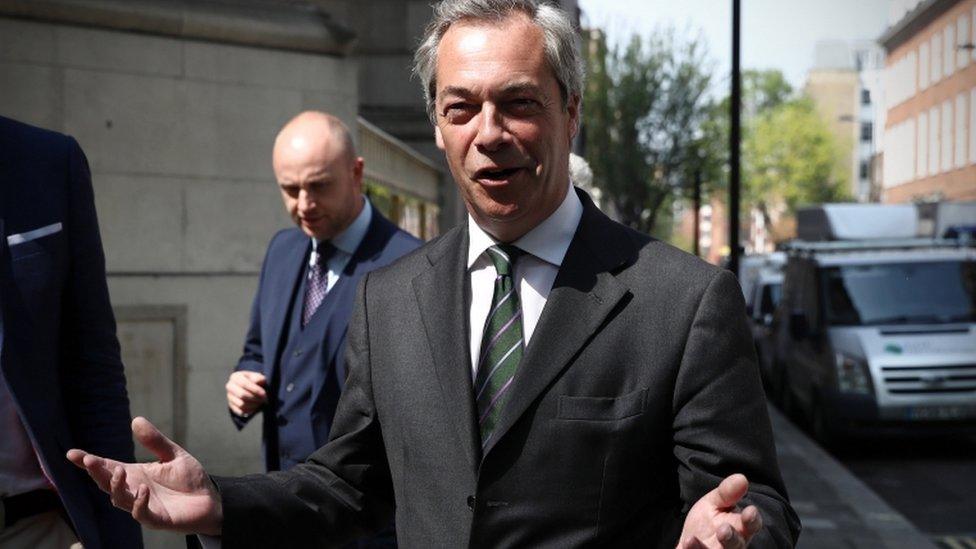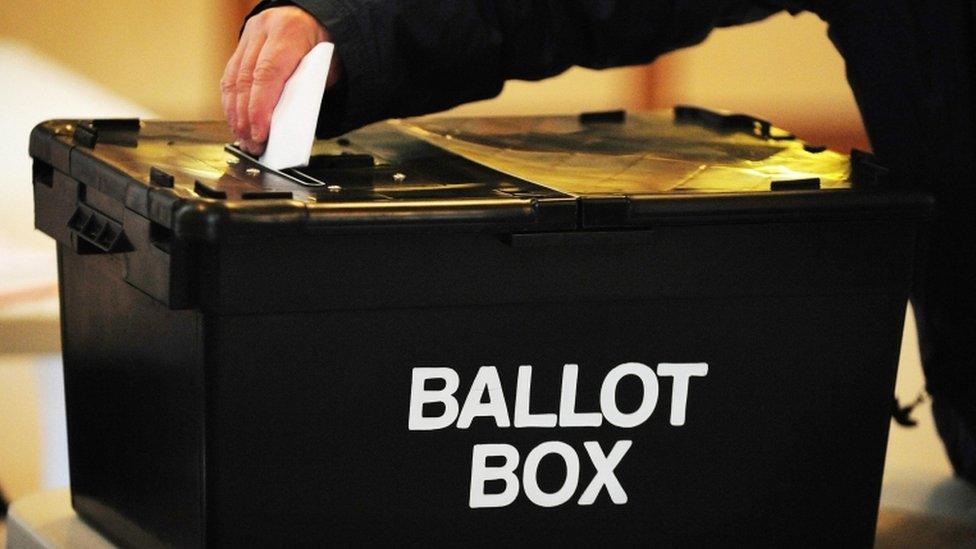Nigel Farage: Narrow Remain win may lead to second referendum
- Published
- comments

There could be unstoppable demand for a re-run of the EU referendum if Remain wins by a narrow margin on 23 June, UKIP leader Nigel Farage has said.
Mr Farage said he believed the Leave campaign were on course for victory.
But he said there would be resentment, particularly in the Conservative Party, if not, with claims the referendum will not have been a fair contest.
Number 10 said Mr Farage's comments showed he was losing the argument and was no longer confident of winning.
And Prime Minister David Cameron said it was a "once in a generation, once in a lifetime" decision, saying the UK had "referendums not Neverendums".
There are less than six weeks until voters go to the polls to decide whether they want the UK to stay in or leave the European Union.
The question of a second referendum was raised by Mr Farage in an interview with the Mirror in which he said, external: "In a 52-48 referendum this would be unfinished business by a long way. If the Remain campaign win two-thirds to one-third that ends it."
Meanwhile, in other campaign news:
David Cameron said so-called Islamic State "might be happy" if the UK left the EU
Labour shadow chancellor John McDonnell urged a "progressive case for staying in the EU"
Boris Johnson said the PM's EU renegotiations were the "biggest stitch-up since the Bayeux Tapestry"
But the ex-mayor of London was attacked by a top EU official for likening the EU's aims to the Nazis
Energy minister Andrea Leadsom argued the UK's energy security would be protected by leaving the EU
The Daily Mirror hosts a live EU debate, with Nigel Farage, Andrea Leadsom, John McDonnell and Lord Mandelson
Asked by the BBC about his Daily Mirror comments, Mr Farage said he was not admitting defeat in the referendum, saying: "I think we are going to win."
But he added: "If we were to lose narrowly, there'd be a large section, particularly in the Conservative Party, who'd feel the prime minister is not playing fair, that the Remain side is using way more money than the Leave side and there would be a resentment that would build up if that was to be the result."
Leave campaigners have criticised the government for spending £9m of taxpayers' money on a leaflet campaign promoting EU membership, with pamphlets sent to 27 million UK homes.
They say the campaign, which they have called "one-sided propaganda", cost more than the £7m each side is allowed to spend during the official campaign period.

Analysis, BBC political correspondent Carole Walker

The prime minister has said that the idea of a second referendum is "for the birds".
He hopes this referendum will settle the question because the last thing he wants is for it to produce a narrow result.
That could indeed end up resulting in continuing pressure to open up the vote again - just at the time when he'll be struggling to heal the wounds that have opened up during this battle.

But Mr Cameron has defended the leaflets, saying the government is "not neutral" in the campaign and it was "money well spent". He said the government had a duty to give voters the "facts".
Speaking to the BBC, Mr Farage denied that his suggestion he would fight for a second referendum would further stoke tensions in the Leave campaign.
"I'm not putting it on the agenda, I don't want a second referendum - I want to win this one," he said.
Johnson 'amnesia'
BBC assistant political editor Norman Smith said Mr Farage's comments opened up the prospect of a repeat of the aftermath of the Scottish referendum - where despite leading SNP figures saying the vote would settle the issue for a generation, there have since been renewed calls for another independence vote.
As the Leave and Remain camps continue to exchange fire on the twin issues of the economy and security, the tone of the campaign has attracted growing criticism.
Boris Johnson has been accused of "political amnesia" after he suggested the EU's objective of creating a "single authority" in Europe had historical parallels with Adolf Hitler in the 1930s.
"Such absurd arguments should be completely ignored if they had not been formulated by one of the most influential politicians of the ruling party," said Donald Tusk, president of the European Council.
"Boris Johnson crossed the boundaries of a rational discourse. Today we have to finally begin to remind ourselves of this banal and perhaps boring truth: the only alternative for the Union is political chaos."
But Conservative minister Chris Grayling said the more that "European Institutions get involved in the debate about what the future of Britain is in the EU the more likely we are to get a leave vote".
Mr Johnson, meanwhile, has criticised Mr Cameron for suggesting Abu Bakr al-Baghdadi, the leader of the Islamic State (IS) group, would potentially be "happy" if Britain left the EU.
The PM said in a speech on Monday morning it was worth asking "who would be happy if we left" the EU, and added: "Putin might be happy, I suspect Al Baghdadi might be happy."
Mr Johnson said it was "a bit much" to compare people "arguing for freedom in this country, or the restoration of democracy in this country, to say our allies are Putin and Daesh (IS)".
Subscribe to the BBC News EU referendum email newsletter and get a weekly round-up of news, features and analysis on the campaign sent straight to your inbox.